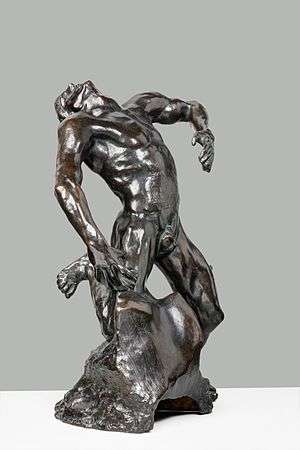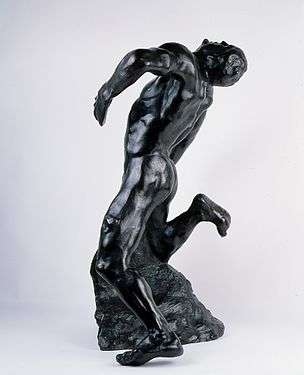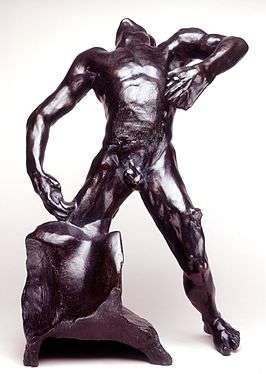The Falling Man (Auguste Rodin)
| French: L'Homme qui tombe | |
 The Falling Man, 3/4 view | |
| Artist | Auguste Rodin |
|---|---|
| Year | 1882 |
| Type | Sculpture |
| Medium | Bronze |
| Dimensions | 58.8 cm × 39.9 cm × 31.2 cm (14.9 in × 10.1 in × 7.9 in) |
| Location | Museo Soumaya, Mexico City |
The Falling Man (in French: L'Homme qui tombe) is a sculpture by French artist Auguste Rodin modeled in 1882[1] and is part of Rodin's emblematic group The Gates of Hell.
This figure represents the cumulative human forces, cast upon the eternal emptiness of Hell.[2] In The Gates of Hell, the sculpture appears in three different places: at the top of the left door, at the top of the right pilaster— the one holding Crouching Woman as part of I am beautiful[3]— and as the central piece of Avarice at the bottom of the Gates. Judging by the position of the first figure, some authors have suggested that Rodin suspected his commission would be canceled[4] because the arched position of the man would make difficult, if not impossible, to open and close the doors, hindering its function.[5]:248–249
Is worth noting that, even though this figure appears in different directions in The Gates, its muscles stay the same; which hints at Rodin's idea of taking an artistic license regarding gravity. [Note 1] This concept heralds the modernist movement, which favors expression over verisimilitude.
-

Side view
-

Front view
Notas
- ↑ According to Elsen:[5]:15
Meditating on how a figure in sculpture was expected to adhere to the pull of the earth, Rodin came to ask, What if the figures could be as free of gravity in sculpture as they are in painting? (...)
It was while the working on The Gates of Hell that Rodin may have pondered the tyranny of gravity over sculpture, leading to a self-interrogatory, What if I change the orientation of a well-made figure without adjusting anatomy in its new relation to gravity? The Falling man in three orientations, The Martyr and other figures from The Gates of Hell were the answer...
Referencias
- ↑ Metropolitan Museum of Art. "Auguste Rodin | The falling man". The Met, official website. Retrieved July 7, 2016.
- ↑ Gónzalez, Jesús (September 26, 2014). Cuando se congele el infierno [When Hell freezes over]. Septem. ISBN 9788415279198. Retrieved June 10, 2016.
- ↑ Musée Rodin. "I Am Beautiful". Musée Rodin, official website. Retrieved October 14, 2016.
- ↑ Museo Soumaya (2016). La Puerta del Infierno [The Gates of Hell] (1st ed.). México: Fundación Carlos Slim. A.C. pp. 248–250. ISBN 978607780518-2.
- 1 2 Elsen, Albert Edward; Jamison, Rosalyn Frankel (2002–2003). Bernard Barryte, ed. Rodin's Art: the Iris & B. Gerald Cantor Collection at Stanford University (in inglés). New York: Oxford University Press. ISBN 0195133811. Retrieved July 7, 2016.